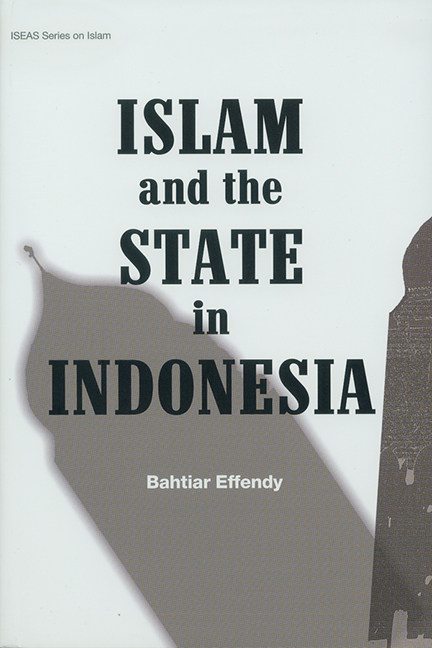Book contents
- Frontmatter
- Dedication
- Contents
- Abbreviations
- Acknowledgements
- Chapter 1 Introduction: The Problem of Political Relationship between Islam and the State
- Chapter 2 Explaining the Uneasy Relationship: Political Antagonism between Islam and the State in Indonesia
- Chapter 3 Emergence of the New Islamic Intellectualism: Three Schools of Thought
- Chapter 4 Implications of the New Islamic Intellectualism: Ideas and Practices
- Chapter 5 Beyond Parties and Parliament: Reassessing the Political Approach of Islam
- Chapter 6 Reducing Hostility: The Accommodative Responses of the State
- Chapter 7 Conclusion: Towards an Integrated Political Relationship between Islam and the State
- Chapter 8 Political Islam in Post-Soeharto Indonesia: A Postscript
- Bibliography
- Index
- About the Author
Chapter 2 - Explaining the Uneasy Relationship: Political Antagonism between Islam and the State in Indonesia
Published online by Cambridge University Press: 21 October 2015
- Frontmatter
- Dedication
- Contents
- Abbreviations
- Acknowledgements
- Chapter 1 Introduction: The Problem of Political Relationship between Islam and the State
- Chapter 2 Explaining the Uneasy Relationship: Political Antagonism between Islam and the State in Indonesia
- Chapter 3 Emergence of the New Islamic Intellectualism: Three Schools of Thought
- Chapter 4 Implications of the New Islamic Intellectualism: Ideas and Practices
- Chapter 5 Beyond Parties and Parliament: Reassessing the Political Approach of Islam
- Chapter 6 Reducing Hostility: The Accommodative Responses of the State
- Chapter 7 Conclusion: Towards an Integrated Political Relationship between Islam and the State
- Chapter 8 Political Islam in Post-Soeharto Indonesia: A Postscript
- Bibliography
- Index
- About the Author
Summary
The crux of the political problem is simply this: The resurgence of Qur'anic Islam in the last century has contributed greatly to the emergence of the collective consciousness of the Muslim peoples, to what Karl Deutsch would call their “social mobilization.” The limitations inherent in this process do not derive chiefly from the problem of converting Muslim consciousness into national loyalty, or from unrealistic attempts to implement detailed prescriptions of the Shari'a. The limitation comes, rather, from the veto power that Islamic consciousness continues to exercise over the whole realms of political ideology and action. Of course this may not be entirely a bad thing. It perhaps exercises restraint over totalitarian tendencies. But it is also related to the tendency in many Muslim lands to rely on what Soedjatmoko calls “virtual images,” rhetorical devices as a substitute for any serious and thorough program of political reform.
Robert N. BellahThe political relationship between Islam and the state in Indonesia has been largely a story of mutual antagonism and distrust. This adversarial relationship has been due primarily, but not wholly, to the conflicting ideas among the nation's founding fathers, the majority of whom were Muslims, on what constituted an ideal Indonesian independent state. Crucial in the debate was whether the state should be “Islamic” or “nationalist” in character. The former necessitated that Islam, given its holistic nature and the fact that it is professed by the majority, be adopted as the ideological basis of the state. On the ground that Indonesia is socioreligiously heterogeneous, for the sake of the country's unity, the latter required that the state be based on a “deconfessionalized” ideology — Pancasila.
The fact that such ideological discourse instigated conflict was not so much because of the different degree of religious devotion among the Muslims — a notion which underpins the famous santri–abangan and Islamic–secular (or religiously neutral) nationalist concepts. Rather, it was due largely to the inability of the nation's political elite to negotiate and reconcile those differences, as if Islam and nationalism are mutually exclusive entities.
- Type
- Chapter
- Information
- Islam and the State in Indonesia , pp. 13 - 64Publisher: ISEAS–Yusof Ishak InstitutePrint publication year: 2003

